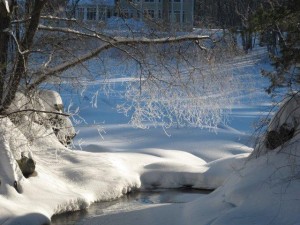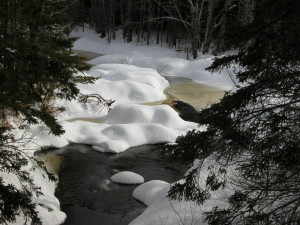
The sluice way of 18th and 19th century Peabody saw mill as seen last week from Mill Street, Middleton. A fast flowing riffle of Boston Brook has melted an opening in the deep snow. Note the ice from vapor that condensed and froze on the lower branches of the tree leaning over the opening. The walls seen are ruins of the mill.
Photo by Pamela Hartman.
Water Closet Complete for 1-10-14 Snowbound
Note: The following essay was published on February 11, 2011. Last week’s blizzard has us revisiting Whittier’s famous long poem about a storm here almost two centuries ago. The farmer, poet, abolitionist, and Quaker would hardly recognize the heavily wooded land here today. His father’s Haverhill farm like the rest of southern New England was largely open fields. He would certainly recognize our snow storms. The trucks and plows that keep us unbound would be new to him.
Confined in the Closet during recent storms some of us old timers harkened back to John Greenleaf Whittier’s long poem Snowbound1 that many of us Yankees had to read in school. Whittier lived two centuries ago just up the road on a Haverhill farm.
Snowbound’s first four lines are perfect:
The sun that brief December day
Rose cheerless over hills of gray,
And darkly circled, gave at noon
A sadder light than waning moon.
An old Closeteer, who was made to read all 30 or so pages of rhyme, some bordering on doggerel, lays the above lines on us every December. We decided to find our copy of Snowbound to help relieve this winter’s periods of cabin fever. As the snow appropriately piled up around our drafty riverside shack, its wood stove hot, we went back with Whittier to his farm and a remembered boyhood storm. It may have been like those blizzards we had in 1978 and 1996 that went on for days leaving two to three feet of new snow and higher drifts in their wakes.
A couple pages into the poem after the storm forecast above, Whittier continues:
And when the second morning shone,
We looked upon a world unknown,
On nothing we could call our own
Around the glistening wonder bent
The blue wall of the firmament,
No cloud above, no earth below,
A universe of sky and snow!
In the past two months we’ve wakened several times to such transformed worlds. One storm has piled upon another with no thaws in between. So far, two months of winter to go, two yards have fallen; to date one still covers unfrozen ground. Without truck powered plows we would be truly snowbound.
John Greenleaf and brother while admiring the new world are ordered to action:
A prompt, decisive man, no breath
Our father wasted: “Boys, a path!”
Well pleased, (for when did a farm boy
count such a summons less than joy?)
Our bushkins on our feet we drew;
Our mittened hands and caps drawn low,
To guard our necks and ears from snow
We cut the solid whiteness through;
And, where the drift was deepest, made
A tunnel walled and overlaid.
We boys over a century later reveled in the mornings after. Our snow shovels like Whittier’s were of wood. So armed we went forth and cut narrow canyons in cold drifts. When done with paths to cow barn and chicken pens we sought out neighbors who paid us well for clearing their walks and driveways. We could earn what seemed a fortune in a morning. Our parents blessed such enterprise. One storm remembered in the mid-forties blocked back country roads for several days. Even the largest town plows couldn’t get through. Gangs of men and boys living along the roads went with shovels and broke through. Deep snow was not only exciting and beautiful, it left us with lifetime memories of working well with neighbors and kin.
Such storms don’t just end; afterwards, arctic winds shift the hoary dunes around to fill in cleared paths and roads. Whittier remembers well those post storm winds down from Canadian highs:
All day the gusty north-wind bore
The loosening drift its breath before
Low circling round its southern zone,
The sun through dazzling snow-mist shone.
Then back we’d go with shovels, tired and even a little bored like our round the clock, day after day, modern plow crews must be. We wish that our grandchildren on no-school-days would venture out in face tingling cold with shovels. Alas, now snow blowers exhale the “breath”.
Young Whittier, chores over, explores the novel scenes just beyond his snowbound farm:
We minded that the sharpest ear
The buried brooklet could not hear,
The music of whose liquid lip
Had been to us companionship,
And, in our lonely life, had grown
To have an almost human tone.
Here he misses the sound of a deep buried brook. He knows it flows below but cannot see or hear it. Miles of brooks around our towns are now so hidden. Above fast flowing riffles where the snow has melted are holes revealing fast clean flow, yet not well heard due sound absorbing snow. Beware of passage over, upstream and below, these unseen tunnels. We’d hate to find you missing ‘til spring thaw.
One old Closeteer is struck by the word “lonely” in a line above. His school vacations and weekends were spent with self and grandfather hoeing and weeding; picking sweet corn and other crops; mowing and haying; and doing endless farm chores. He says his patient kindly grandfather must have suffered from his endless chatter when they were together. Quiet grandpa gently acknowledged him with low grunts, perhaps sighs now and then, and every couple days wise comments that weren’t soon forgotten.

Wilson Stream in Dennysville, Maine, about as far downeast as you can get, flows eventually to Cobscook Bay. Note the tannin from decaying vegetation staining the ice.
Photo by Fred Gralenski
We’ll leave Whittier now, man of a million lines, who last lived in Danvers. His famous Snowbound goes on and on about other joys experienced over the years by farm boys near the coast. He, like other Victorian poets, mixes all kinds of classical analogies with local history. Our favorite lines from Snowbound quoted every few years here are of his thoughts during winter chores of summer times with father just down the Merrimack by the sea:
Or nearer home our steps he led
Where Salisbury’s level marshes spread
Mile wide as flies the laden bee;
Where merry mowers, hale and strong,
Swept, scythe on scythe, their swaths along
The low green prairies of the sea.
Those salt marshes are now white with brittle salt water ice and snow. More is on its way.
1 Whittier, John Greenleaf. Snow-Bound and Other Poems (The Peter Pauper Press, Mount Vernon, New York) This poem was first published in 1866 when Whittier was 59.
Note: If you’d like to learn more about Whittier, so attuned to Essex County, see the best of his several biographies written by the Old Closeteer’s late English teacher Roland H. Woodwell, who devoted his life to his dead hero and to his Amesbury High School students. After retiring from teaching he finished John Greenleaf Whittier: A Biography, which was published under the auspices of The Trustees of the John Greenleaf Whittier Homestead, Haverhill, Massachusetts, in 1985. Quaker Whittier was far more than a prolific poet of his times. He was a famous champion of the slavery abolition movement. Mr. Woodwell bought Whittier’s Amesbury house and lived there for much of his long life.
WATER RESOURCE AND CONSERVATION INFORMATION
FOR MIDDLETON, BOXFORD AND TOPSFIELD
| Precipitation Data* for Month of: | Oct | Nov | Dec | Jan | |
| 30 Year Normal (1981 – 2010) Inches | 4.40 | 4.55 | 4.12 | 3.40 | |
| 2013 – 14 Central Watershed Actual | 1.10 | 3.35 | 5.30 | 1.9 as of 1/7** | |
Ipswich R. Flow Rate (S. Middleton USGS Gage) in Cubic Feet/ Second (CFS):
For Jan 7, 2014: Normal . . . 52 CFS Current Rate . . . Bkw***
—————————————————————————————————-
*Danvers Water Filtration Plant, Lake Street, Middleton is the source for actual precipitation data thru Nov. Normals data is from the National Climatic Data Center.
**Updated Jan precipitation data is from MST gage.
***Backwater, valid Instantaneous flow data not available.
THE WATER CLOSET is provided by the Middleton Stream Team: www.middletonstreamteam.org or <MSTMiddletonMA@gmail.com> or (978) 777-4584